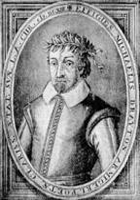Michael Drayton Biography
Drayton was born at Hartshill in Warwickshire and as a youth he became page to Sir Henry Goodere of Polesworth. He fell in love with Sir Henry's daughter, Anne, and worshipped her as 'Idea' in his poetry. Even after her marriage to Sir Henry Rainford he continued to celebrate her charms in verse, and he never married.
He had wanted to be a poet from the age of ten, and achieved his ambition through hard work and a succession of noble patrons, in spite of some ill-fortune. His first work was a verse paraphrase of parts of the Old Testament and Apocrypha, The Harmony of the Church. Ironically, the Harmony caused offence among the authorities and was banned. When James I became king in 1603 Drayton angled for royal favour with To the Majesty of King James: a Gratulatory Poem. Unfortunately he omitted to include the customary tribute to the late Queen Elizabeth, and this gaffe probably cost him an appointment at court.
In spite of this setback, Drayton had a fairly successful career as a poet, and he counted Ben Jonson and William Drummond of Hawthornden among his friends.
Since there's no help, come, let us kiss and part,
Nay, I have done, you get no more of me,
And I am glad, yea, glad with all my heart,
That thus so cleanly I myself can free.
...
FAIR stood the wind for France
When we our sails advance,
Nor now to prove our chance
Longer will tarry;
...
To Despair
I ever love where never hope appears,
Yet hope draws on my never-hoping care,
...
How many paltry, foolish, painted things,
That now is coaches trouble every street,
Shall be forgotten, whom no Poet sings,
Ere they be well wrapt in their winding-sheet.
...
